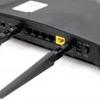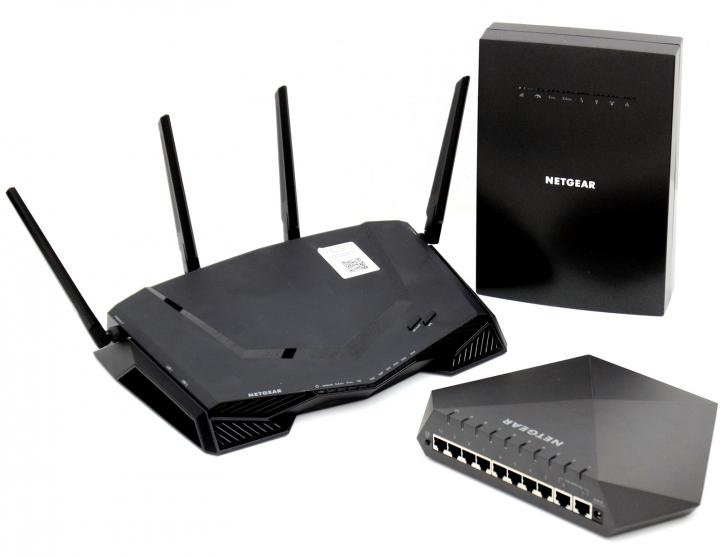Final Words & Conclusion
Final Words & Conclusion
Gamer targeted network gear, yeah, Netgear is onto something. I must admit I thoroughly enjoyed testing the magic three combo of tested products today. The Nighthawk Pro Gaming XR500 router is impressive. Both the 2.4 GHz and 5 GHz bands show really strong signal and performance throughout our test environment. The router has got some very cool options and the sheer hardware as well as its 4+1 Gigabit ports is all pretty sweet. And hey, looks wise you can't ignore it either with its stealthy design. Really impressive is the new DumaOS, Netgear really has done that right. It looks great, works great and is fast to use as well. Inside the DumaOS you'll be greeted by some fun gaming functionality as well with the Geo filter and advanced QoS functionality. Everything a good router needs is spotted in this one, it's really good. I would like to see the VPN client functionality to be expanded to more services though. The range of this router is really good, especially in separate bands (AC 5GHz preferred) we had no problem filling the house with proper connectivity, I mean I am not making a pun here, but when you get 300 Mbps throughput on your smartphone in an enclosed bathroom... hey, that's good. The 2.4 GHz signal also reaches anything in the house, again very good. Should you for whatever reason need a little more coverage, then the NightHawk X6S Range Extender performance (EX8000) really does an exceptional job boosting the signal so that you get coverage in the tiniest spots in your house.
Of course, gaming over a wired connection is always preferred to WIFI, here again, we cannot complain. In fact, I threw in the NightHawk Pro gaming (SX10) as a bit of a bonus. Now I could only measure at 5 Gbps as I did not have a second 10 Gbps ethernet adapter sitting around, but sjeeeesssh, the LAN network performance of the near future is fast my man. You can see so many scenarios where that speed would work great, a 5 or 10 Gbps NAS, for example, would get you speeds in excess of 400 MB running up-to even 800 MB/sec on 10 Gbps. You'd need some NVMe lovin inside that NAS of course, but hey, the thing is we've been stuck at that 100 MB/s marker on NAS servers for years now. We need to move forward man!
Nighthawk Pro Gaming router (XR500)
For the conclusion page we'll zoom into each product one by one. The XR500 router first, and it's impressive on all fronts. Overall wired throughput is really good, for LAN to LAN measurements we topped a near maximum 950 Mb/sec but that's normal for any Gigabit router these days. The power consumption can be discussed, as far as I am concerned at 10 Watts we do think that the unit is consuming quite a bit. With your household devices online 24/7 these days your power bill will increase 17.50 Eur per year. If you take into account that you can also use the unit as a NAS with external storage connected to the router, well that does help out in the equation, of course. USB 3.0 / NAS throughput performance is good, reads are close to 72 MB/s, writes a notch lower at ~ 45 MB/sec. The DumaOS web interface works and responds fast as well. But let's get to what it's all about for this puppy; WIFI performance. The sole reason for you to purchase this router is twofold, it's an optimized gaming router. But here I would say that packet prioritization and QoS functions that give priority to the gaming ports remain trivial, any modern age router can easily cope with the load at hand, even while you are transferring gigs of data over LAN, this should not be a problem for even a 100 USD/EUR router. Nope, you purchase a router of this class for next-level WIFI performance. The new Geo range setup is interesting, but would you really use it? It is however nice to see extra gaming features.
All popular WIFI standards are supported, and albeit each and every router is limited to a certain amount of output power regulated by the government. From 2.4 GHz up-to-the 5 GHz bands we see good performance. I mentioned this already, but my laptop is the client test device (router is the host), and the max it can do is dual-band WIFI. We passed 500 Mbit/s on AC, however, measure averaged out throughput, and here we reach roughly 400 Mbit/s in the same room. That's real, properly measured throughput performance. So the WiFi range/strength definitely is good though comparable to other high-end routers from DLINK, Linksys and TP-Link. Of course, results will differ per household, environment (city/rural), WIFI devices connected but also your client. If your laptop has poor WIFI reception and antennas, the XR500 also might help a bit, but yes, the client side of WIFI is as important as the host side. So as always, it is the symbiosis of all parts used that ensure the success of your WIFI network. And yes, that 5 USD WIFI adapter through Ali-express might seem good value, but likely will offer worse results. We also need to understand that our bandwidth is getting more and more cluttered with WIFI signals these days and everybody simply pushes more through WIFI. You all have a wireless router, everybody has a WIFI smartphone, tablets, media server and a lot of common household peripherals have some sort of WIFI. Heck, WIFI enabled washing machines? But it is the future though, everything is connected to the Internet, ergo you need a solid foundation to work from. These factors combined form the most important denominator, the device that it all connects to is very important in terms of WIFI quality and range. From web browsing, downloading to playing games on your PC, TAB, netbook or laptop... the router will be more than sufficient in terms of bandwidth and reach. It has strong send and receive signals. Obviously, the 5GHz AC band based devices is what you need to migrate towards, as Wireless G and N are just not worth it anymore. But if you have older devices requiring it, for that purpose it offers a very strong signal. In short, this is a great gaming router, both wired and wireless. The one thing I miss though is dual-band 5G connectivity, a second band on 5G would have been really nice. So 2.4+5+5 in Triple band configuration would have been really sweet, especially in this price class.
NightHawk X6S Range Extender (EX8000)
You have noticed that the extended mesh range remains a little limited. With an extender, do not expect miraculous performance increases, what you may expect however is proper signal throughout your house. The EX8000 is, in fact, a triple band extender, and it certainly did boost signal everywhere. Especially in my attic, all measured bands showed significant performance increases and better signal, even doubling up performance. For the ranges where the signal already is optimal with just the router, certainly performance and signal will not increase. My advice is always very simple, first buy a router, and once you really run into limited WIFI range inside your house, that's when you need to look into a repeater or some mesh functionality. That said, the EX8000 works flawlessly and is easy to set up. Once installed every gap in every little corner had more than sufficient WIFI available. It is a beast of a repeater really, also if you have an ethernet cable with internet present, just plug it into the repeater, reset, setup and configure it as an access point, that as well is an option. Pretty cool are the extra gigabit jacks on the extender, so yes, you can hook up devices wired as well. Adding repeaters, extenders and thus, in the end, mesh functionality to your routers is a very interesting move to make. It helps, yes, it works, yes, it's easy enough to setup, yes, but always first check out if you really need one as they certainly are not cheap, albeit in all honesty, this unit is not too expensive for what you get. But as far as hardware goes, this is as good as it gets with current generation technology.
NightHawk Pro gaming (SX10)
So with this router review, I also had the opportunity to test the new SX10 switch. Hey, WIFI is great, but in the end, most gamers prefer wired internet for as little lag and latency as possible. For many years now the industry is running into a limitation with Gigabit Ethernet. You guys know it from my motherboard reviews, where I state this all the time. It is time to move onwards to faster ethernet. While a gigabit jack is still plenty enough for most people, I feel the industry has come to a halt on this topic. Aquantia has been targeting the consumer market with 2.5, 5 and 10 Gbps Ethernet adapters. And really, we need to advance. While transferring files at 100 MB/sec over LAN may seem fine, it just can be so much faster. At a 5 Gbps connection, you could transfer files over LAN at SATA3 performance up-to 500 MB/sec. With a 10 Gbit connection, you can double that (give or take). Up to 5 Gbps ethernet jacks, you don't even have to change your ethernet cables, Cat 5 will work fine! And for 10 Gbps a Cat 6 cable will suffice. There is so much to gain from faster Ethernet, super fast internet, super fast file-transfers but also even lower latency. The industry needs to make a start, some motherboards already have an Aquantia solution embedded offering 2.5, 5 or 10 Gbps Ethernet. We'll see that more and more in the near future. Once you have two devices operating in the 2.5, 5 or 10 Gbps Ethernet ranges, you'll need a switch, and that's why I included the SX10 in this review. To give you a small taste of what is possible and what is coming. Unfortunately, the SX10 only has two Multi Gbit jacks, but they are two proper 10 Gbps ones with fallback to 5, 2.5, 1 Gbit and sure, 100 and 10 Mbit as well of course, full duplex. The switch performs exceptionally as you have seen in the results. The software is amazing as well, this is a managed switch, typically with features you'll only find in the data-center market. But here again, it had a gaming overhaul, it's easy to use and set up. Though we doubt that you'll be using the management features. But they're nice to have. The performance throughput was exceptional at the measured 1 Gbit and 5 Gbit connections. What a device, my only gripe is that it has just two 10Gbps ports, but hey, I want moar! What a beast.
Concluding
Right, testing three products in one review might have been a bit much to swallow and read, apologies. But the truth is that a network is an infrastructure of compatible ethernet devices. The symbiosis of it all is what counts and, as such, the three tested products today are a pretty sweet match. The Nighthawk Pro Gaming series products, as tested today, can all be recommended if needed. The symbiosis of it all works well. I loved, even adored the new Multi-Gig Switch by the way. But that is my enthusiast hardware heart speaking. Slowly but steadily I hope the industry can move onwards to Multi-GigE Ethernet, it's such a logical next step and the SX10 performed admirably. The Nighthawk Pro Gaming XR500 is an excellent router with a really nice DumaOS interface. It offers proper features, pretty much anything you need from a router and then adds to that proper hardware. A dual-core router with 512MB of memory, really it's a small server. Paired with a proper WIFI implementation you receive very good range inside your house. Especially the separate 2.4 GHz and 5 GHz AC bands are very powerful with a lot of reach in your house. I do miss triple band at 2.4+5+5 for some astonishing final performance. However, I'll settle for the current setup easily as well, as the single band performance is just that strong and good to even excellent in range. With such good range and performance, really there wasn't a real need for the NightHawk X6S Range Extender (EX8000), but it did prove that besides being a very powerful triple band extender, it boosted performance and connectivity on my most upper floor, the attic, and accounts for all tested bands. The unit itself is very easy to set up and it's a nice feature to have, of course.
- Nighthawk Pro Gaming router (XR500) € 279 / $299,- / £239,-
- NightHawk X6S Range Extender (EX8000) € 169 / $179,- / £159,-
- NightHawk Pro Gaming (SX10) € 289,- / $289,- / £249,-
The last lines then, I've written enough. You have seen the results from all products individually. Overall we really liked what we tested, pricing, however, is a complicating factor. Gaming routers, switches of this insanely nice level and extenders are expensive. That goes for all brands of course, but each tested device here will cost you some serious dough. Also, if you are in the market right now for a proper gaming router, you do need to weigh in that another new technology is coming, this year already, based on the new extended AX WIFI protocol. Regardless, we hand out a recommended award to each and every product tested in this review. We enjoyed both the hardware and software side of things and, combined with the solid overall performance, there's just little left to argue.
- Sign up to receive an email when we publish new articles
- Or go back to Guru3D's front page.



